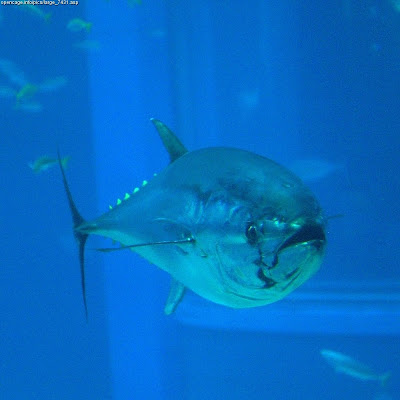
Everyone's had some time to digest the tragedy that befell the Atlantic Bluefin Tuna and its supporters late last week, when the Convention on International Trade in Endangered Species (CITES) meeting rejected a ban on its sale.
So here are just a few of the most salient points I've come across.
The BBC highlights an unsurprising problem:
Sue Lieberman, director of international policy with the Pew Environment Group, suggested lobbying from the fishing industry was ultimately responsible for the defeat."This meeting presented a golden opportunity for governments to take a stand against overfishing, and too many governments failed to do so," she said."The market for this fish is just too lucrative, and the pressure from fishing interests too great, for enough governments to support a truly sustainable future for the fish."
The thing is, Ms. Lieberman's comments are misleading in at least one way that Carl Safina put his finger on:
Japan says a ban would devastate fishing economies. As if destroying the fish won’t.
Opponents of the ban -- and let's face it, it was not all about Japan and Canada, since it essentially went down by a vote of 68-20 and CITES requires two-thirds support for passage -- pulled out the battle cry of the obstreperous: There's already another agency responsible for this!
That would be the execrable International Commission for the Conservation of Atlantic Tunas (ICCAT), which doesn't inspire a lot of faith based on past performance.
In a great post that touches on all the essentials of what stinks about the Atlantic Bluefin's plight, Richard Black at BBC's EarthWatch blog doesn't mince too many words:
So poorly has this body performed its task (it was declared a "disgrace" by an independent performance review two years ago) that conservationists have another way of interpreting its initials - the International Conspiracy to Catch All Tunas.And it was in frustration with Iccat's annual habit of setting quotas higher than its scientists recommended (they have advised zero quotas for the last few years) that conservationists turned to a CITES ban as an alternative way of reducing the catch.
Black goes on to note that: a) the Europeans are being disingenuous in all this, since they should be able to mobilize the ICCAT if they so choose, no matter what they say; b) the economics do not necessarily favor "sustainable" fisheries for commercial outfits, since ships can go just about anywhere, early payoffs (think: high prices in the short term) can be wrung out and turned into easy money elsewhere, and subsidies for scrapping old fleets can ease any lingering scruples; and c) the "tragedy of the commons," which basically states that people are willing to crap all over something in their effort to exploit it to their own maximum benefit, is at play.
It's a devastating indictment, to be sure. Rarely are there such clear-cut cases of species needing protection. And seldom is the failure to act in the broader interest more conspicuous than in the case of the Atlantic Bluefin Tuna.
No comments:
Post a Comment